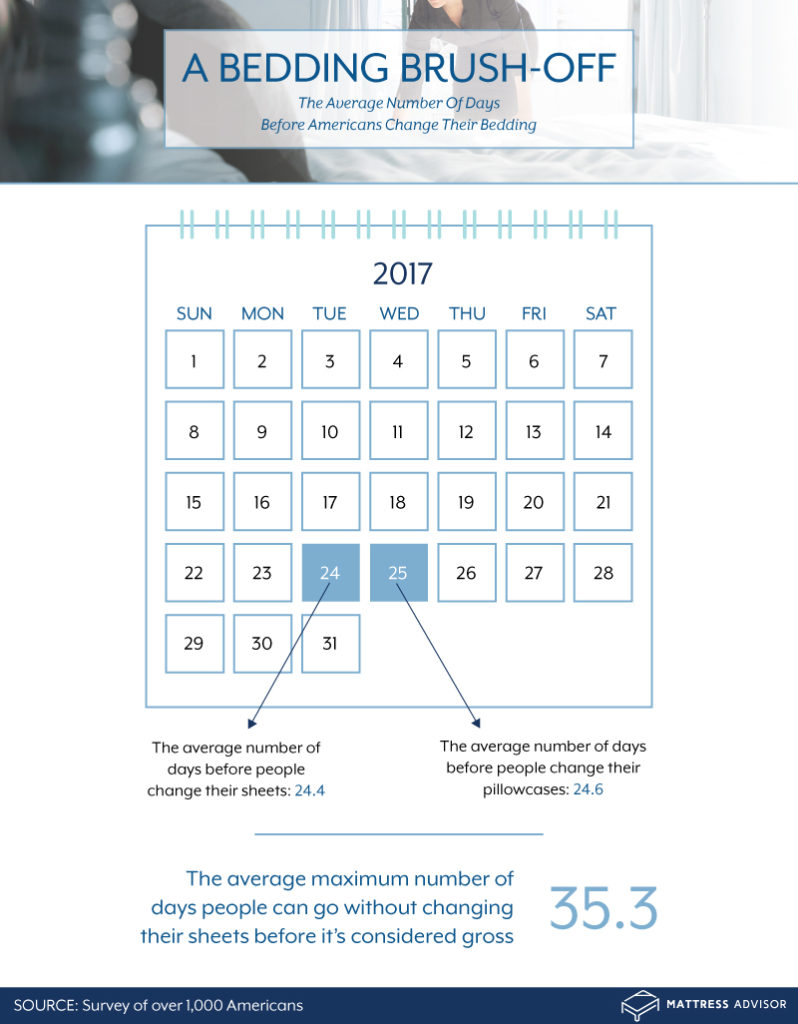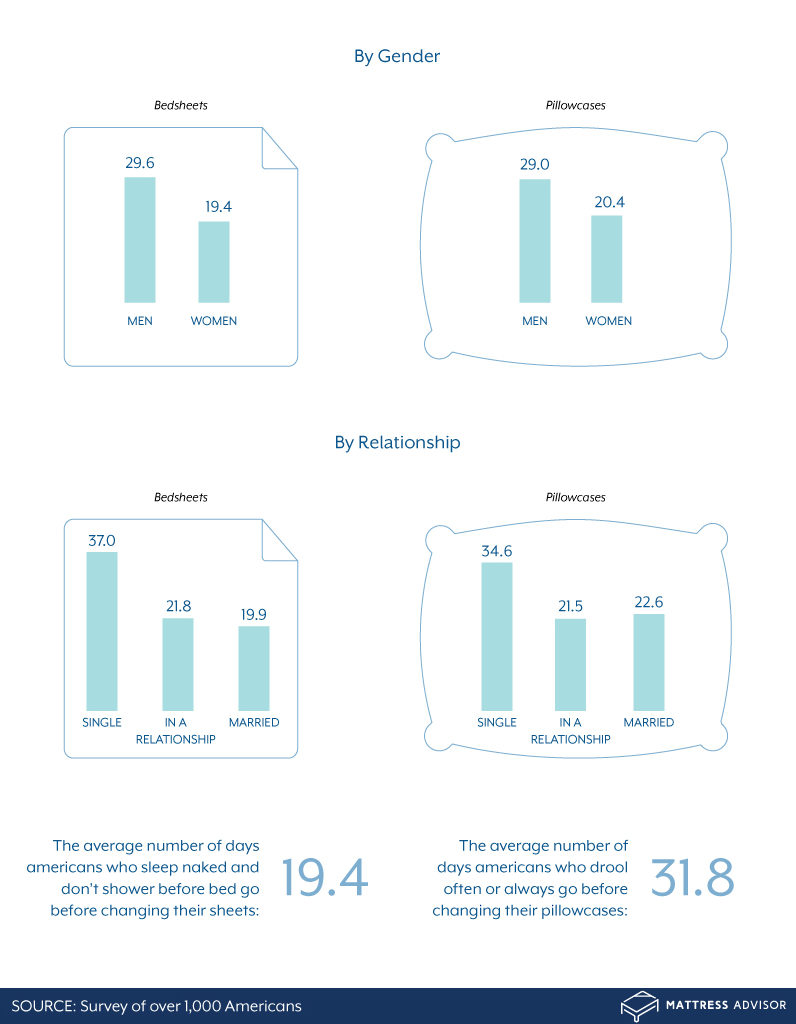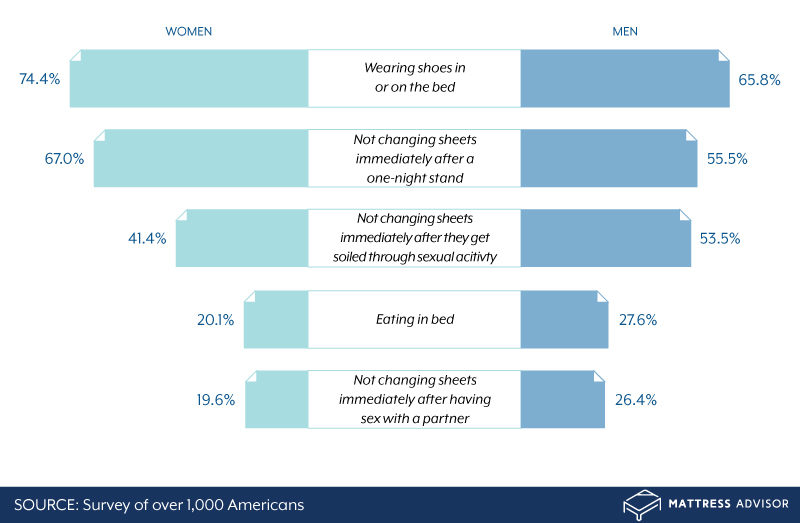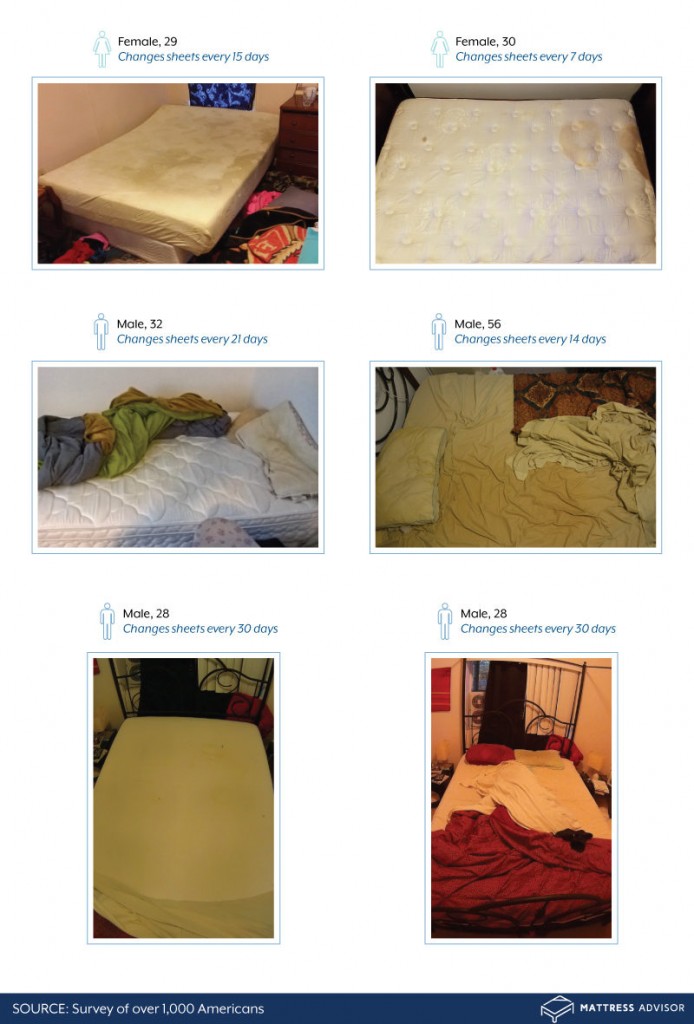Editor’s note: This article was originally written in 2017 and has since been updated. Our sister site, Mattress Advisor, conducted the survey and is now a part of Sleep Advisor.
If your sleep habits are relatively healthy, you’ll probably spend about a third of your life1 on your mattress. That means of all the linen in your life, your sheets are your most consistent companions. Ready to crash after a long day at work? They’re waiting to greet you. Getting in a nap on a weekend afternoon? They’ve got you covered.
Considering our daily reliance on sheets, we might get a little lazy about taking care of them in return. Even if we’re diligent about washing other items, from dishes to our clothing, we sometimes forget our sheets need frequent cleaning as well.
Hygiene standards vary widely, but there’s plenty of evidence to suggest keeping our sheets clean can keep us healthier as well, especially considering unwashed bedding is inviting to bacteria.
We set out to learn how often average Americans changed their sheets and which demographics were best at keeping them clean.
We surveyed over 1,000 people about their bed-cleaning habits and then asked them how gross (or not gross) they perceived different bed hygiene habits to be. Want to know how your sheet cleaning compares to that of the crowd? Read on to find out.
A Bedding Brush-Off
The average number of days Americans go before changing out their bedding

According to our findings, the average person changes sheets roughly every 24 days, or a bit less often than once every three weeks. Interestingly, pillowcases had a slightly longer average unwashed period, clocking in at 24.6 days before being cleaned or swapped for fresh ones. Depending on your own habits, these stats may seem unsurprising or unacceptable. Either way, experts would encourage a more frequent cleaning cadence, with some suggesting cleanings every one to two weeks2 to help prevent allergens.
Our respondents had their own limits for unwashed bedding, however, claiming that it could take up to 35 days before they’d consider their unwashed bedding “gross.” Their disgust past this point is justified: Five weeks of unwashed sheets can allow for a pretty significant accumulation of unsavory particles. With the average person shedding about 600,000 skin cells3 each day, you’d be piling up a veritable feast for dust mites in that time.
Bedding Behaviors
The average number of days Americans go before changing their bedding, by demographic

When it comes to hygienic sheet care, guys fell woefully short of their female counterparts. On average, men waited over 10 days longer to swap their sheets, and that gap didn’t improve much in the pillowcase department. Single men fessed up to particularly questionable sheet cleaning practices, going nearly 45 days before changing their bedding on average.
Overall, relationship commitment seemed to correlate with more frequent washing. Respondents in a relationship had the shortest average time between pillow cleanings, while married folks had the cleanest record for sheets. Assuming two people often occupy one bed in these relationships, their washing habits are well justified by this tandem use.
Similarly, those who slept naked without showering before bed washed their sheets comparatively often, as one might hope. The same could not be said for respondents who drooled regularly, however: They waited a baffling 31.8 days, on average, before changing their pillowcases.
Sex and Sheets
How often Americans change their bedding when sex is involved

Women may change their sheets more often, but men are more likely to do so when they sense they’ll be sharing their bed with someone else. Nearly half of men reported changing their sheets if they knew they’d be getting intimate with someone that night, whereas fewer than 40 percent of women said the same. In fact, 43 percent of male respondents opted for clean sheets if sex was even a possibility. Given men’s lengthy average times between washes, they may have a good reason not to take any chances.
After sex, however, women again proved more vigilant about cleaning their bedding. After the act itself, they waited for less than half as long as men before getting clean sheets. Women changed sheets even sooner after a one-night stand.
Related: Best Mattress for Sex
Bad in Bed
The percentage of Americans who find different sleep scenarios gross, by gender

Although beds are essentially private places, our respondents found a range of behaviors unacceptable for anyone to practice between the sheets. The significant majority of men and women condemned shoes in the bed – and who can blame them for wanting to leave the contents of the streets off their sheets? Not changing sheets after a one-night stand also ranked high on the gross meter among both genders.
Interestingly, men were more likely than women to find several actions objectionable, despite their general tendency to leave their sheets unwashed far longer. For instance, eating in bed and not immediately changing sheets after sex with a partner both struck a greater percentage of men as gross.
American Beds at a Glance
A select group of personal mattress images

While no photo can attest to the microbial buildup unwashed sheets carry, we asked our respondents to submit visual evidence of their bedding hygiene. Regardless of how often both males and females claimed to change their sheets, we saw our fair share of splotches and discoloration.
Usually, the cause of pillow yellowing is accumulated moisture from things like sweat, drool, wet hair, natural body oils, and facial creams/lotions.
Learn more about how to clean a mattress here.
How Often Should You Wash Your Sheets?
Experts advise that people wash their sheets at least every one to two weeks.2
So, how does our washing frequency compare with what the experts recommend? From our findings, it appears that go an average of over three weeks between washings, which suggests that many of us aren’t washing our linens enough for our bed space to remain as clean and healthy as possible.
If there are more people, pets, and activities in the bed, or you have health-related concerns, go for the once-a-week option. If you have fewer people, activities, and health concerns, you can stretch it to two weeks.
Remember to wash your linens in hot water and dry in a hot dryer if possible, to kill the dust mites and bacteria. A furnace filter can help cut down on them as well. If there are health-related issues like asthma or skin conditions like acne, you should wash more often. What everyone can likely agree on, though, is that clean sheets feel exceptionally good.
Related: Best Sheets 2024
Conclusion
Our findings prove there’s no rule when it comes to America’s sheet-washing habits. Because we spend so much time surrounded by our bedding, we hope this research helps readers reflect on the conditions they’re inhabiting for hours each night. Great sleep can be the foundation of a healthy and productive lifestyle, but dirty sheets can keep you from the rest you need – not to mention adversely affecting your health in other ways. Step up your sheet-cleaning routine with our guide, and rest easier knowing you’re not sharing the bed with unwanted pathogens.
Healthy sleep goes deeper than your sheets, however. At Sleep Advisor, we make it our mission to help customers find the perfect bed, tailored to their unique sleep needs. When it comes to finding the best mattress, good advice can really pay off – after all, you’re spending a third of your life on it.
METHODOLOGY
We surveyed over 1,000 Americans on the frequency with which they washed their sheets and pillowcases and then posed questions regarding different in-bed habits they might regard as unsanitary. We then segmented their responses according to their self-reported demographic information to determine the findings above.
FAIR USE STATEMENT
If you want to share this content with your audience (or just someone you wish would change his or her sheets more often), you’re welcome to do so. Simply provide a link back to this page to credit us appropriately.

Alesandra Woolley
Editor
About Author
Growing up in the City That Never Sleeps, she learned the hard way how important a good night of rest really is. She’s made it her mission to help others realize the same. On any given day, you’ll find Alesandra in our Mattress Lab testing the latest mattress models, interviewing specialists on the importance of sleep, or curating the most helpful content for our readers. Alesandra’s been featured in Business Insider, USA Today, MarketWatch, Elite Daily and the NY Post for her perspectives on sleep health.
Stomach Sleeper
Education & Credentials
- Certified Sleep Science Coach
References:
- Aminoff, Michael J., Boller, François., Swaab, Dick F. “We spend about one-third of our life either sleeping or attempting to do so”. Handbook of Clinical Neurology. 2011.
- Shipp MD, Desmond. “How often should you wash your sheets?”. Ohio State University Wexner Medical Center. 2019.
- Smith, Suzannah. “6 weird facts about your body”. Texas A&M Health. 2016.